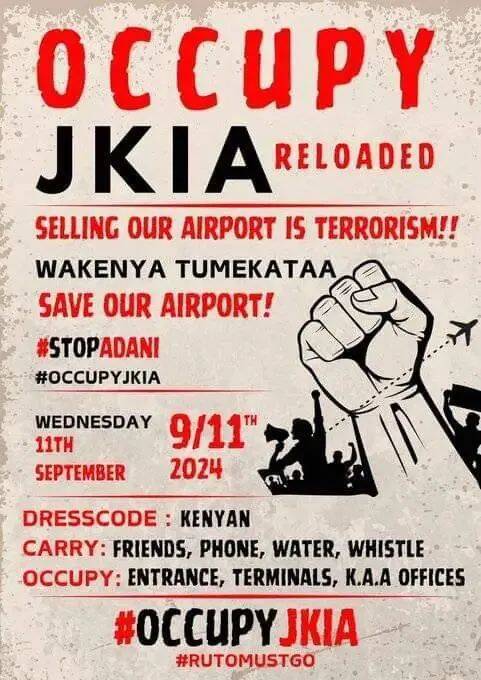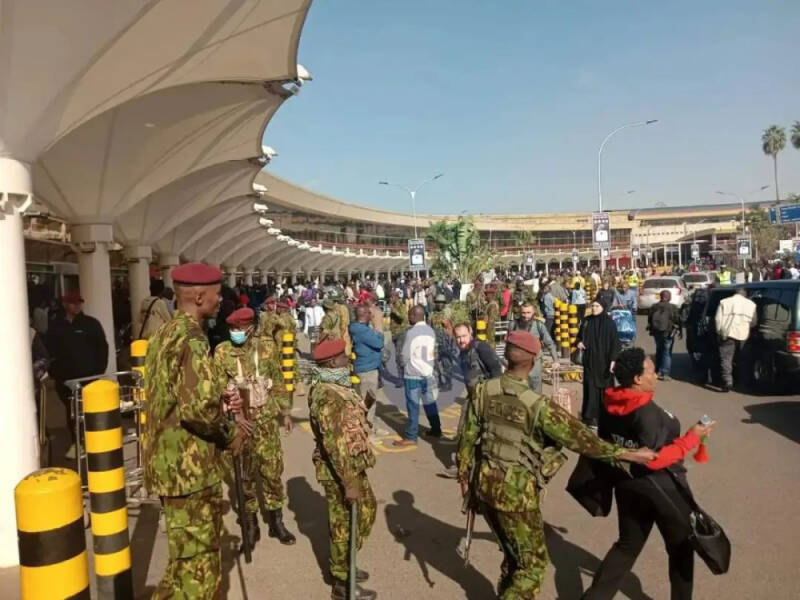Sudden! Strikes and demonstrations break out at Kenya's capital airport
Employees at Jomo Kenyatta International Airport (JKIA) in the Kenyan capital Nairobi went on strike on Sept. 11 to protest the deal between India's Adani Group Group and the Kenyan government, local media reported.

According to the Kenyan government, due to the current operating capacity of Kenyatta International Airport exceeds government expectations and needs to be modernized, but the Kenyan government will not sell the airport, so it has decided to upgrade the airport through public-private partnership. It is reported that the government has received an offer from the Adani Group of India, but after the Adani Group takes over the airport operation, Kenya Airlines employees will need to renegotiate the contract with the new group and may face the risk of unemployment. In addition, the new terms of cooperation may include the introduction of non-Kenyan employees, thus causing dissatisfaction among existing employees.
It is understood that Jomo Kenyatta International Airport (JKIA) is the largest airport in Kenya and the busiest airport in East Africa. As a result, the impact of the strike is so great that Kenyan airport staff are said to have slowed down on the evening of September 10, which has led to a large number of delays and cancellations of inbound and outbound flights. By September 11, strikes and marches had taken place inside and outside the airport, with stranded passengers on the outskirts of the airport.

According to some flight software, the latest flight is from New York to the airport, and there are no other flights to the airport. Affected by this, the airport operation chaos, Kenya Airways announced that some flights have been delayed, and may even be cancelled. At present, the government has dispatched military and police to take over the security of the airport and maintain the basic order of the airport.
It is said that according to earlier data released by the Kenyan Ministry of Finance, Kenya's current foreign debt is about 36.66 billion US dollars (about 4.7 trillion shillings), and the Kenyan government needs to obtain more funds to repay its foreign debt. Therefore, the Kenyan government has launched a series of measures to obtain funds, such as increasing tariffs and public-private partnerships.
The new fiscal bill introduced by the government in June will impose a 16% value-added tax on the purchase of bread, sugar transportation, the use of mobile communications and financial services, and foreign currency transactions. But the fiscal bill sparked public discontent, and demonstrations against tax increases broke out in many parts of Kenya, during which police clashed with demonstrators, killing and injuring many people. The demonstrations continued until early August, when the president finally had to give in, cancel the fiscal bill, dissolve the cabinet and so on.
But Kenya's foreign debt problem remains, and the government needs to find other ways to solve its foreign debt. Airport investment is one of the steps, but at the same time, it has sparked dissatisfaction among airport staff and launched strikes and demonstrations at the airport. At present, the airport strike has a serious impact, in addition to the outage of airport services, but also affects the tourism industry, the freight industry and some industries.
As the airport is an important gateway for investors to enter Kenya, the strike has had a significant negative impact on market sentiment, which may affect the desire of other countries or companies to invest in Kenyan industries, which is not conducive to the development of other industries. Prior to this, Kenya also launched a new reform of the coffee industry, which led to the closure of many large coffee trading companies in Kenya and coffee processing plants, while some coffee processing plants suffered from severe capacity shortages, resulting in a decline in output and quality. Kenya's export earnings continued to decline at a time when coffee prices were high.
In addition, due to the worrying internal security situation in Kenya's neighboring Ethiopia, some coffee traders have reduced their purchase of coffee beans in Ethiopia and turned to other African countries such as Kenya and Tanzania, but the current strike at Kenya's airport has also reduced the desire of coffee traders to go. According to people in the local coffee industry, due to the problem of foreign debt, soaring prices, rising inflation, rising costs, and chaotic political situation, the development prospect of the coffee industry is very uncertain, and coffee prices are rising, affecting international influence.
For more information about coffee producing areas, please scan the code directly and follow: coffee comments.
Long press the QR code to follow:
Important Notice :
前街咖啡 FrontStreet Coffee has moved to new addredd:
FrontStreet Coffee Address: 315,Donghua East Road,GuangZhou
Tel:020 38364473
- Prev

Manner sells beef noodles! Netizen: 5 yuan for bringing bowls?
▲ Click to pay attention| Daily Boutique Coffee Culture Magazine Coffee Factory Recently, some netizens noticed a unique Manner shop under a commercial office building. Instead of a cup of coffee, the guests sitting in the store were placed in front of them. A steaming meal. In the video, this Manner looks like
- Next

What are the well-known coffee producing areas in Colombia? What are the characteristics of the Tolima production area?
South America is located in the southwestern hemisphere and is the fourth largest continent in land area. In the western part of South America, it is mainly traversed by the Andes Mountains. Therefore, the western part is mainly composed of plateaus, hills and mountains, with numerous volcanoes at an altitude of 300- 3,000 meters, while the eastern part is mainly The vast Amazon River Basin, with many rivers and land
Related
- What grade does Jamaica Blue Mountain No. 1 coffee belong to and how to drink it better? What is the highest grade of Blue Mountain coffee for coffee aristocrats?
- What are the flavor characteristics of the world-famous coffee Blue Mountain No. 1 Golden Mantelin? What are the characteristics of deep-roasted bitter coffee?
- Can I make coffee a second time in an Italian hand-brewed mocha pot? Why can't coffee be brewed several times like tea leaves?
- Hand-brewed coffee flows with a knife and a tornado. How to brew it? What is the proportion of grinding water and water temperature divided into?
- What is the difference between Indonesian Sumatra Mantinin coffee and gold Mantinin? How to distinguish between real and fake golden Mantelin coffee?
- What does bypass mean in coffee? Why can hand-brewed coffee and water make it better?
- Unexpected! Ruixing Telunsu lattes use a smoothie machine to foam milk?!
- % Arabia's first store in Henan opens into the village?! Netizen: Thought it was P's
- Does an authentic standard mocha coffee recipe use chocolate sauce or powder? Mocha Latte/Dirty Coffee/Salty Mocha Coffee Recipe Share!
- What is the difference between Vietnam egg coffee and Norway egg coffee? Hand-brewed single product coffee filter paper filter cloth filter flat solution!

